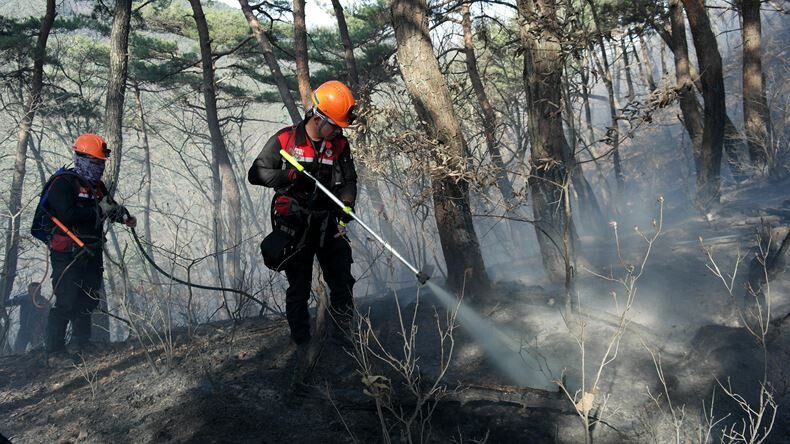
Just as the massive fire that turned Sancheong and Hadong in Gyeongsangnam-do into ashes began to subside, we had to face heartbreaking news. Three veteran wildfire prevention and control team members, all over sixty, and the young public official who led them tragically never returned from the inferno. Leaving aside the devastation of the bereaved families, what we must focus on is the fact that their unfortunate deaths are not simply an 'accident' but clearly bear the hallmarks of a 'preventable disaster'.
The protective gear the deceased wore at the fire scene was flimsy construction site helmets, and they weren't even provided with proper fire-resistant clothing to protect their bodies. All they had in their hands were leaf rakes for clearing debris and a knapsack sprayer with a single container of water. It's hard to even imagine how helpless they must have felt facing the raging flames. Who is truly responsible for sending 60-year-old contract workers, who had only completed 10 hours of training and were not professional firefighters, to the forefront of the fire without even adequate equipment?
Wildfire prevention and control team members, hired under the guise of wildfire prevention and surveillance, are the first to be deployed to dangerous fire scenes. However, in most cases, these positions are filled by public work program personnel of local governments, not directly by the Korea Forest Service. What has the nation offered in return to these individuals who have silently carried out their duties amidst low wages and unstable employment? Failing to provide even basic safety equipment and sending them into deadly situations without a risk prediction system or emergency escape training is a clear dereliction of duty, and frankly, amounts to 'homicide'.
In a perilous situation where strong winds caused the fire to spread rapidly, the isolated firefighters, without proper protective gear, would have been helpless. Construction helmets melting from the intense heat, knapsack sprayers inadequate to stop the flames – the harrowing testimonies of survivors vividly illustrate the desperate situation at the time. The cries of the bereaved families and current firefighters that this was a "foreseen tragedy" starkly reveal how long our society has neglected this issue.
The anger of a citizen who stated that nothing has changed since the Hongje-dong fire accident in the 1990s resonates deeply. It is truly deplorable that the safety of aging firefighters is pushed to the back burner, and they are driven into dangerous jobs with even the physical fitness test standards being relaxed due to a shortage of personnel. Can jobs that gamble with lives ever be justified?
Among the approximately 9,600 wildfire prevention and control team members nationwide, a significant number are temporary or indefinite-term contract workers, and their average age is steadily increasing. Due to poor treatment and hazardous working conditions, young people are reluctant to apply, leading to a vicious cycle of these positions being filled by older individuals. Outdated equipment and insufficient emergency systems foreshadow another tragedy.
Regarding this accident, the Ministry of Employment and Labor has classified it as an industrial accident and is investigating potential violations of the Serious Accidents Punishment Act. However, punishment alone cannot bring back the precious lives that have already been lost. As experts point out, similar accidents will inevitably recur without structural reforms. It is urgent to prepare fundamental measures, such as resolving the aging firefighter structure, strengthening professionalism, expanding regular employment, and modernizing outdated equipment. Securing dedicated budgets and national funding for this is also crucial.
As warned by the Korea Fire Service Officials Union, the lack of a national-level wildfire response system and budget places the entire burden on local governments, ultimately creating a structure where tragic sacrifices are repeated whenever large-scale wildfires occur.
The excuse that 'it couldn't be helped' is no longer acceptable. We must learn a valuable lesson from this tragedy. We must remember that nothing takes precedence over safety and immediately take practical measures to improve the safety and treatment of wildfire firefighters. The way to honor the spirits of the heroes who perished in the fading flames is to build a safe Republic of Korea.
[Copyright (c) Global Economic Times. All Rights Reserved.]



























